LESSON 2.2
Determine the “New” Idea
Grades 4 - 6

Let’s say Lesson 2.1 produced these answers among others:
- a fat gerbil
- my horse, Flicka
- palomino pony
- Shetland pony
- Mongolian pony
- calico cat
- catfish
- red cap Oranda goldfish
- American chinchilla rabbit
- aye-aye lemur
- German shepherd
- blobfish
- seeing-eye dog
- Canaan seeing-eye dog
- axolotl
- didinium
- ice worm
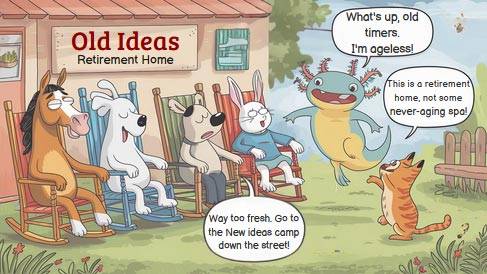
Grading Ideas
You have done a great job! Now test to see which is the best idea.
Grade ideas based on how readers’ interests:
A = adult stranger probably does not know this AND is probably interested (+ wow!).
B = adult stranger probably does not know about this.
C = adult stranger probably knows this OR probably is not interested.
Task 2.2.1 – Small Group or Class
Grade your ideas. You can do that as a class or as a small group. Do not argue. For example:
Grade
A fat gerbil
My horse, Flicka
Palomino pony
Shetland pony
Mongolian pony
Calico cat
Catfish
Red cap Oranda goldfish
American chinchilla rabbit
Aye-aye lemur
German shepherd
Blobfish
Seeing-eye dog
Canaan seeing-eye dog
Axolotl
Didinium
C
C
B
B
A
B
C
B
B
A
C
A
C
A
A
A
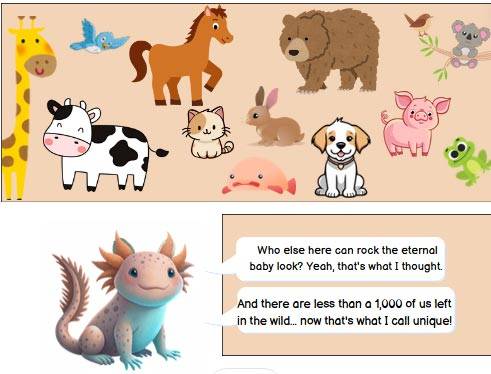
Task 2.2.2 – Small Group
Why did each idea earn the grade that it did?
Task 2.2.3 – Small Group or Class or Small Group
Draw a Decision Chart. Use these criteria for evaluating each idea:
- Which is most likely to interest adult readers?
- Which most interests you?
- Which has a good amount of research without there being too much information?
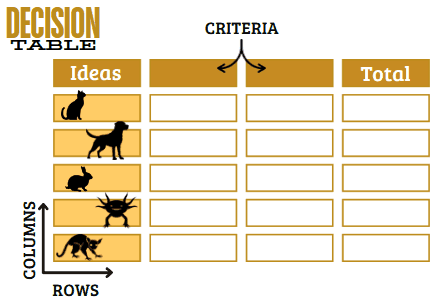
You have three criteria, so you will need five columns.
Column for ideas
Three columns for the criteria
Column for the total number of points
You have five A ideas, so you will need six rows.
Row for heading
Five rows for ideas
Ideas | Interests adults | Interests you | Good info | Total |
Mongolian pony |
|
|
|
|
Aye-aye lemur |
|
|
|
|
Blobfish |
|
|
|
|
Canaan seeing-eye dog |
|
|
|
|
Didinium |
|
|
|
|
- Because you have five ideas, each column will have 1-5. Five will be the highest.
- Your table’s range will differ if you have more or fewer A ideas.
- Indicate the best first (5), then assign a 1 for weakest.
- No column should have two or more of the same number.
- Flip a coin in case of tie.
No A Ideas?
If you can’t come up with any A ideas right away, then funnel down B or C ideas.
To funnel ideas, make an idea more and more specific.
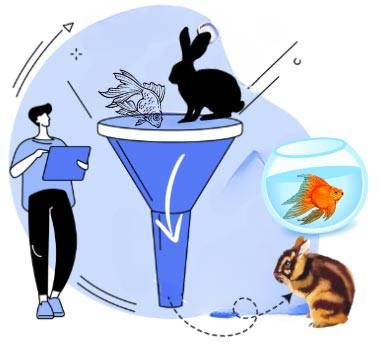
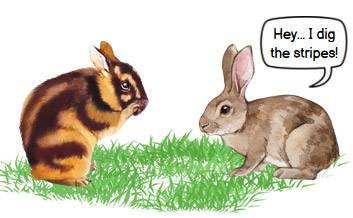
Rabbit
Netscheri, aka Sumatran striped rabbit
(world’s rarest rabbit)
Goldfish – Tailless meteor goldfish
(world’s rarest goldfish)
You have eight A ideas, which usually is plenty of ideas. But for teaching sake, let’s pretend that you don’t like any of them, so you add the two that you just found. Now your Decision Table looks like this:

| Ideas | Interests adults | Interests you | Good info | Total |
|---|---|---|---|---|
| Mongolian pony | ||||
| Aye-aye lemur | ||||
| Blobfish | ||||
| Canaan seeing-eye dog | ||||
| Axolotl | ||||
| Didinium | ||||
| Netscheri rabbit | ||||
| Tailless meteor goldfish |
Since there are now eight ideas, grade the list 1-8, with 1 being lowest.
| Ideas | Interests adults | Interests you | Good info | Total |
|---|---|---|---|---|
| Mongolian pony | 4 | |||
| Aye-aye lemur | 8 | |||
| Blobfish | 1 | |||
| Canaan seeing-eye dog | 3 | |||
| Axolotl | 6 | |||
| Didinium | 7 | |||
| Netscheri rabbit | 2 | |||
| Tailless meteor goldfish | 5 |
Before going to the next column, make sure that no number is repeated in the column you did. Do this after each column. Then total them by adding up the score in each row.
| Ideas | Interests adults | Interests you | Good info | Total |
|---|---|---|---|---|
| Mongolian pony | 4 | 3 | 4 | 11 |
| Aye-aye lemur | 8 | 6 | 7 | 21 |
| Blobfish | 1 | 4 | 1 | 6 |
| Canaan seeing-eye dog | 3 | 2 | 5 | 10 |
| Axolotl | 6 | 5 | 8 | 19 |
| Didinium | 7 | 8 | 6 | 21 |
| Netscheri rabbit | 2 | 1 | 2 | 4 |
| Tailless meteor goldfish | 5 | 7 | 3 | 15 |
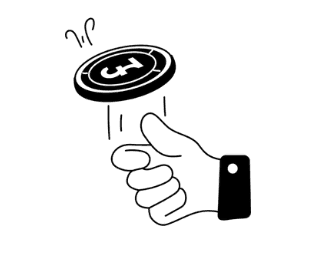
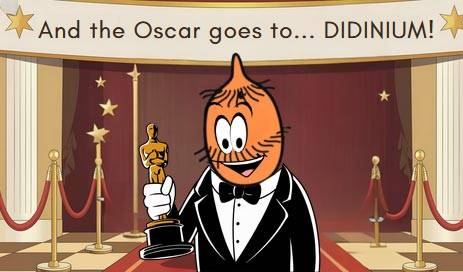
Didinium is the winner!
You were rooting for aye-aye, but you trusted the Decision Table to guide your choice.
Always using Decision Tables to help you pick subjects keeps you from a tap that even many college students run into! They decide on a subject only to struggle later because there’s either too much or too little information on it.
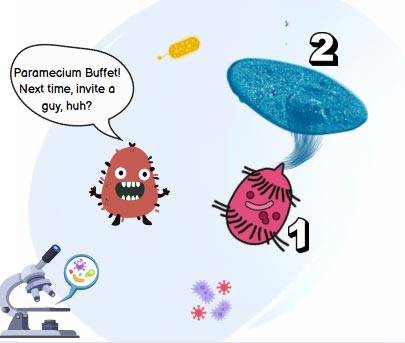
A didinium (1) has caught a paramecium (2) and is now feeding, slowly sucking its prey whole.
As single-celled predators, didinia are constantly on the hunt for its favorite meal: Paramecium.
They both live in freshwater, though a few species also occur in saltwater.
Review
- Step 2: Grade the Ideas.
Assign grades to your ideas based on how your target audience will react. Keep in mind, just like a car salesperson focuses on the buyer’s preferences, it’s your reader’s opinion that matters most. - Step 3: Rank the Top Ideas.
Pick at least five of your best ideas and rank them, with “1” being the lowest. For now, use the criteria we’ve covered. You’ll learn to develop your own criteria as you progress through the program.

Task 2.2.4 – Individual, Tandem, Small Group, or Class
Create a Communications Barbell. Enter the winning idea in the right-hand (RH) end. We will call that the Right-hand Variable. Enter the word I in the Left-hand Variable slot.
The language of the prompt asks you, What animal would you like to be? So enter would like to be on the bar, also known as the Verb Phrase, or VP.

Task 2.2.5 – Tandem or Small Group
Check the Communications Barbell: 1- Is it a sentence? (If it sounds like a sentence, then it’s almost always a sentence.) 2- Are there two variables? 3- Is at least one variable a “New” idea. (The readers determine what is “New.”)
Task 2.2.6 – Tandem or Small Group
Draw a What Statement (what the subject is) like the one below. Enter your info in row 3.
| What Statement | ||
|---|---|---|
| LH | VP | RH |
